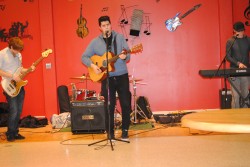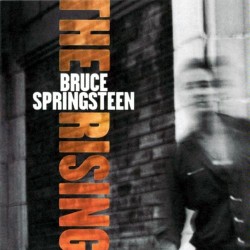9/11 Influences Music of All Types
by lmennen • September 29, 2011 • Uncategorized • 0 Comments
By LAUREN MENNEN
“Can’t see nothin’ in front of me, can’t see nothin’ coming up behind. I make my way through this darkness – I can’t feel nothing but this chain that binds me.”
These lyrics tell the story of a firefighter climbing up the stairs of the twin towers right after the planes hit, and is part of Bruce Springsteen’s hit song “The Rising,” released during the summer following Sept. 11.
The song is a reaction to 9/11, and is part of Springsteen’s album, The Rising, which feature all songs related to the attacks.
“Bruce Springsteen’s The Rising left such an emotional impact on the music world because it was a call to rebound and literally “rise up” from the tragedy that had happened some months earlier,” said Steve Carter, lead singer of north New Jersey Indie Rock group, Escape Directors. “It’s an uplifting, heartfelt summary of the American struggle and how our country stood together after 9/11.”
Carter finds the lyrics in “The Rising” so powerful, that even thinking about it gives him chills. “Whenever I listen to that record I feel an incredible sense of patriotism and honor,” Carter said in an e-mail.
Throughout history, music’s power has served to heal an ailing society. The devastation of Sept. 11 united America in a way it has never before, and music became a platform for major artists to express their thoughts and allow their fans to join them in reflecting on 9/11. Now, a decade later, people are still using music to remember the heroes and victims from America’s most tragic day by attending and participating in commemorative concerts.

Steve Carter, the lead singer of Escape Directors, is an avid Bruce Springsteen fan and enjoyed his 9/11 album "The Rising." Carter is pictured here performing at William Paterson University. -photo by Lauren Mennen
“It’s important for musicians like Springsteen to write about tragic events because they have the loudest voice,” said Carter. “When they speak or sing, we listen. Whenever anyone is given the greatest gift of all, which is to express themselves, I feel it’s their right as musicians to speak on subject matter that affects our daily lives.”
Click here to listen to Bruce Springsteen’s The Rising
The Rising is arguably one of the most emotional and reflective albums of that time, but there were many other hits as well, such as country singer Alan Jackson’s song “Where Were You (When the World Stopped Turning)”, which topped the Billboard Charts, and won “Song of the Year” at the Country Music Awards in 2001.
Neil Young also had a hit single at the time called “Let’s Roll.” It included a conversation from one of the victims on the hijacked plane, Flight 93. The passenger was Todd Beamer, and the song includes his last words on a recorded phone, which were “let’s roll.”
Many other artists took the opportunity to express their feelings in music, and helped a grieving country heal.
Remembering by celebrating
Music influenced people throughout the decade of 9/11 in many ways by inspiring and helping people deal with this difficult time. Ten years later, music is still a major role in commemorating all affected by 9/11.
Many concerts took place on the 10th anniversary of Sept. 11, but Composer Daniel Feslenfeld organized a concert of his own, called “Music After,” that had more of a celebratory atmosphere than other memorial concerts. The concert wasn’t necessarily for the victims as much as it was for the composers and songwriters who lived in the area of the World Trade Center on Sept. 11.
“It was a celebration of the living, of those who were hurt and scared and continued to create the music they create,” Felsenfeld said.
Felsenfeld held the concert at Joyce Soho in downtown Manhattan. The start time was 8:46 a.m., the time the first plane hit the North Tower, and went well past midnight. This 15-plus hour concert played all types of music, “from contemporary classical music to downtown minimalism, from country to cabaret to be-bop jazz,” Felsenfeld said.
“Music After” gave artists who were affected by 9/11 a place to go to and celebrate life, rather than just mourning the victims. Felsenfeld was just one block away at the time of the attacks, so it has impacted him tremendously.
“I wanted to make a place for my community to go, have a place that me and my friends could be if they wanted to be there,” Felsenfeld said.
Carter stressed how important music moves with people and time, marking landmark moments and etching a place in collective memory.
“Music gives people a reason to remember, forget, or honor tragic events that may happen in their lives,” said Carter. “After 9/11 we needed purpose and we especially needed music to move on with our lives and importantly to never forget what had happened.”
Related Story:
Real Life Tragedy on the Big Screen
